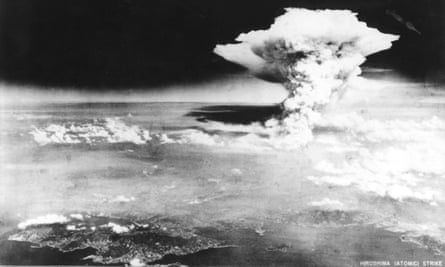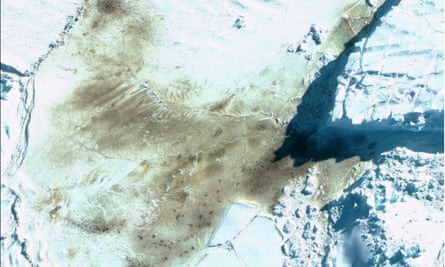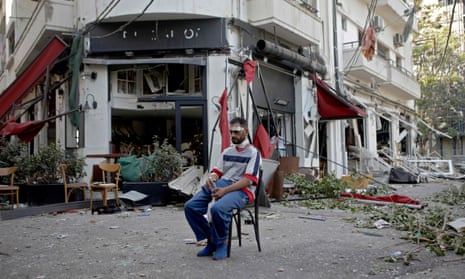Good morning.
Lebanon was already suffering from a catastrophic economic crisis and a rise in coronavirus cases before the massive explosion that ripped through its capital on Tuesday evening, leaving at least 100 people dead, 4,000 injured, and many more feared trapped beneath the rubble. Beirut’s hospitals are overwhelmed, while up to 250,000 people have reportedly been left homeless by the blast.
Donald Trump told reporters the incident “looks like a terrible attack”, but the US president was soon contradicted by his own officials – and by the Lebanese prime minister, Hassan Diab, who said the true cause of the explosion was 2,700 tonnes of ammonium nitrate that had been stored in a warehouse at the Beirut port.
Reporting from the streets of the city, Martin Chulov described the immediate aftermath of the blast, and Beirutis’ response:
It takes a lot to shake Beirut, which has risen and fallen under bombs before. But in a city inured to explosion, this was something new. An economic implosion had left a country on edge. Now a devastating explosion of a dimension that few could comprehend. ‘We’re cursed,’ said one man, in his early 20s, blood streaming down his wrist from a glass cut. ‘Even if this was an accident, it’s the last thing we could afford.’
The US is stoking China’s anger with an official trip to Taiwan

The US health secretary, Alex Azar, is set to lead a delegation to Taiwan in the coming days – the most significant US visit to the island since Washington cut diplomatic ties in 1979 to help foster better relations with China. Azar, the chair of the US coronavirus taskforce, said on Tuesday that he and Taiwanese officials would discuss their responses to the pandemic, and described Taiwan as “a model of transparency and cooperation in global health”.
The high-level trip is likely – and likely designed – to anger Beijing, which disputes Taiwan’s claim to independence. Azar, the first US cabinet member to visit Taiwan in six years, also said he intended to “celebrate the shared values” of the two democracies.
The global coronavirus death toll has passed 700,000, just 17 days after it passed 600,000. That’s one death every 15 seconds around the world.
Joe Biden’s plan to help Latinos face the financial crisis

They will make up the largest share of non-white voters at November’s presidential election. And on Tuesday, Joe Biden sought to reach out to Latinos with a wide-ranging plan to address the deepening economic inequalities they face as a result of the Covid-19 pandemic, which has disproportionately harmed communities of colour. The former vice-president has already vowed to undo the Trump administration’s harsh immigration and asylum policies.
Jonathan Swan, the Axios reporter whose grilling of Trump is being widely praised, began his career in his native Australia. Michael McGowan explains Swan’s backstory, including a colourful incident involving kangaroo faeces.
Neil Young is suing the Trump campaign for using his songs Rockin’ in the Free World and Devil’s Sidewalk without his permission at the president’s controversial June rally in Tulsa.
The row over the Hiroshima bomb still rages, 75 years on

It is 75 years since the US dropped a nuclear bomb on the Japanese city of Hiroshima, an attack that likely killed 140,000 people. As many as 80,000 more were killed by a second bomb in Nagasaki three days later. As Julian Borger reports, historians and the military are still debating whether the bombing ended the war, thus saving countless more lives – or whether it was an unconscionable act of brutality.
The Japanese-American writer Erika Hayasaki spoke to Koko Kondo, one of the last living survivors of the Hiroshima blast. In this thoughtful and moving story, she traces the bomb’s long legacy through the anti-nuclear movement, the civil rights struggle and her own family’s history.
In other news …

Antarctica’s emperor penguin population is 20% greater than previously thought. Scientists identified a number of hitherto unknown colonies of the endangered species via hi-res satellite images, which showed the distinctive red-brown guano patches the birds leave on the ice.
Tropical Storm Isaias left at least four people dead as it made its way up the US east coast on Tuesday. Two died when a tornado struck a North Carolina trailer park, while two others were killed by falling trees in Maryland and New York City.
Parks in US minority neighbourhoods are half the size of those in white areas, research has found. Parks serving majority low-income households are also on average four times more crowded than those in mostly high-income areas.
Virgin Atlantic has filed for bankruptcy protection in the US, weeks after the airline said it had secured funding to fly for another 18 months. It is the second crisis to hit a Virgin airline during the pandemic; Virgin Australia went into administration in April.
Great reads

How racism and poverty fuelled the Deep South outbreak
In Alabama as elsewhere, the pandemic has disproportionately killed African Americans. Yet in June, Montgomery’s majority-white city council voted along racial lines against a mask ordinance. Oliver Laughland reports on how generational racism and the legacy of segregation have driven the coronavirus crisis in the Deep South.
The Police’s Stewart Copeland on his CIA agent father
The drummer for the Police was brought up in the Middle East, where his father, Miles Axe Copeland Jr, was secretly working as a CIA “dirty trickster”, contributing to the coups that ousted the leaders of Syria and Iran. “He didn’t lie to us,” Stewart Copeland tells Dorian Lynskey. “He just didn’t tell us the whole story.”
Opinion: the Epstein case shows rightwing media’s hypocrisy
Trump’s media cheerleaders were happy to overlook the president’s past links to Jeffrey Epstein. But now that Bill Clinton is being associated with the late sex offender, they are suddenly up in arms, writes Arwa Mahdawi.
Sexual abuse is not a partisan issue and there is a special place in hell for anyone who treats it as such.
Last Thing: Italy’s oldest graduate is top of his class

As a boy in Sicily in the 1930s, Giuseppe Paternò planned to get a university education – only to be waylaid by poverty, war and the demands of family. But now, at 96, the former railway worker has just become Italy’s oldest graduate.
Sign up
First Thing is delivered to thousands of inboxes every weekday. If you’re not already signed up, subscribe now.
